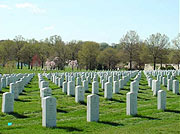Berkeleyan
Study explores impact of U.S. deaths in Iraq on this year’s presidential race
![]()
| 08 December 2004
Contrary to current conventional wisdom, deaths and injuries of American troops in Iraq did hurt the election efforts of President George Bush, while initiatives in 11 states to ban gay marriage had no measurable impact, say two Berkeley researchers.
“These findings don’t mean the war was or was not justified, but that there was a political cost,” said David Karol, an acting assistant professor of political science. “What this shows is that it cost Bush votes.”
Edward Miguel, assistant professor of economics, teamed up with Karol to assess how voters responded to the rising number of U.S. soldiers killed and wounded while on duty in Iraq.
The researchers compared the number of votes Bush received in 2000 with his 2004 election results. Their results indicate that Bush would have garnered 53 percent of the vote instead of 51 percent had there been no U.S. dead or injured — no small matter in such a statistically close contest.
 Support for George Bush in states with high death and injury tolls from the Iraq war was weaker in 2004 than in 2000. (Courtesy Arlington Cemetery) |
The war had no impact on voters in the Deep South, while Northern voters reacted sharply and negatively, the researchers said. They also found that no one state overshadowed the rest, with results remaining the same even if vote tallies from any state were disregarded.
“Had there been very few deaths, Bush would have won four more states, the battleground states of New Hampshire, Wisconsin, Pennsylvania, and Oregon. And he would have won a lot of electoral votes — 328,” said Miguel. “That’s essentially what it looked like a year ago: Bush was way up in the polls, and everyone thought he was invincible.”
But around April, the United States suffered an upsurge in casualties, which have continued to climb, reaching approximately 1,200 by mid-November, the report said.
Because Bush won, there’s a tendency to say that the war didn’t matter, or that it actually helped him by boosting his image as a strong leader, said Karol.
“But those are actually premature conclusions,” he said. “It may be that the war had an effect, and he was elected despite it. Or if he lost, that might not have been why he lost. If you see localized variations in the change of Bush support from state to state over the four years, and that is correlated with the level of casualties that that state has suffered, that makes a more persuasive case — that the casualties had an effect on the election. That is what we found.”
Yet another finding of the study was that the Bush vote appears unaffected by the presence of gay-marriage-ban initiatives in 11 states, or by the call-up of military reservists. Voters opposing gay marriage lined up with Bush early, so the ballot measures to halt gay marriage failed to generate new support for the president, the researchers said.
The 2004 election provided a unique test case, said Karol, because it’s been more than 100 years since the nation has seen a president run for re-election in the midst of a controversial war that he initiated. “The only comparable cases,” he said, “are maybe William McKinley and the Philippine insurrection in 1899–1902. Before that you have to go back to James Madison.”
President Harry Truman opted not to run for re-election while the Korean war continued. Lyndon Johnson made the same decision in January 1968, during the Vietnam war, said Karol. During publicly supported conflicts such as World War II and the Civil War, presidents sought and won re-election, he said.
“Here we have the largest number of casualties since Vietnam,” Karol said. “So it’s a better way to learn about how the political system processes casualties, and what the political consequences of them may be.”
The researchers pointed out that the data shows that even relatively modest war casualties continue to carry political costs.
The study is critical for U.S. foreign policy “to the extent that there are costs to invasions like Iraq, and politicians in the future may have to take them into consideration when they make foreign policy choices,” said Miguel. “Just understanding whether there is an effect or not, and how big it is and how it works, is important for foreign policy and scholars as well.”
A summary of the study’s results is online at emlab.berkeley.edu/users/emiguel/iraq.shtml.

